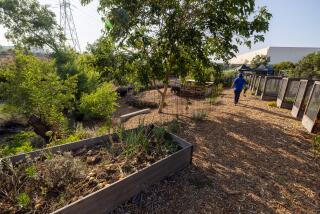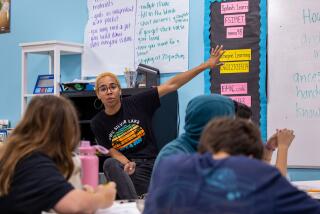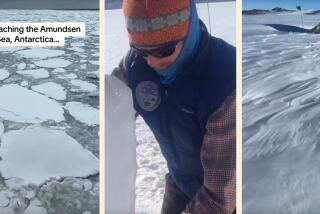Trip Will Let Teacher Get Her Berings
- Share via
At this time next year, Lanai Road Elementary School teacher Dena Gershon will be teaching not from her cozy Encino classroom but on a tiny island in the Arctic. She is one of 16 teachers from across the nation selected to participate in Teachers Experiencing Antarctica and the Arctic.
The program, sponsored by the National Science Foundation, pairs kindergarten-through-high school teachers with scientists for research at the north and south poles.
“I am ecstatic beyond belief about this,” said Gershon, 33, who teaches fifth grade.
For about a month next year, Gershon will be paired with a cultural anthropologist on the Alaskan island in the Bering Strait that is about 15 miles off the Siberian coast. The rocky island--called Little Diomede--has only 160 villagers, half of whom are under 18.
The two-square-mile island has only 41 houses, a tiny schoolhouse, no roads or hotels and only one store. Mail is delivered by helicopter once a week, weather permitting.
Gershon and the anthropologist, Dr. Carol Zane Jolles, will study how much of the village’s nomadic culture has died out since the Cold War when traffic between the island and its sister island, Big Diomede--just two miles away and a Russian territory--was closed.
Before political tensions escalated between the United States and the Soviet Union, families used the frozen Bering Strait as a walkway between the two islands. But in 1948, restrictions were imposed and residents from each island were restricted from seeing one another. Residents from Big Diomede Island were relocated to the then-Soviet mainland.
*
Gershon and Jolles will interview three generations of the Eskimo villagers that remain on Little Diomede. The goal is to report what skills have been lost as the elders die and how the younger generation--which enjoys Internet access in its classrooms--will thrive on the island now that they know more about Nintendo than whale or walrus hunting.
Conditions on the island will be extreme. The ground and ocean will be frozen solid, temperatures will be 30 below zero or lower and the island will be under nearly 24 hours of darkness. Gershon said she is not worried. She minored in anthropology in college and has traveled to places such as Africa, India and New Guinea.
“Only participate if you can have your hands right in the middle of something,” she said.
Gershon was selected for the program partly because of her adventurous spirit and her passion for science. She said being selected for research was a stroke of luck. She only learned of the program after stumbling on the TEA Web site at 2 a.m. while surfing the Web in preparation for a classroom discussion.
“I was salivating [when I found it],” she said. “I always loved to travel . . . and this sense of bringing real-world experience into the classroom hit home in a way that nothing else had.”
The trip also appealed to Gershon’s teaching style. She manages her classroom much like a laboratory, where learning is done using science themes. Traditional disciplines such as writing, math and social studies are used as tools in the scientific process.
“We’re not just using textbooks,” she said. “The kids set the pace. I just direct them.”
Her current crop of students, whom she has taught for two years, will have moved on to middle school by the time Gershon takes her trip. A few plan to encourage administrators and teachers at their new schools to track Gershon’s work on the Internet.
“It’s really exciting for her and for us to learn about life there,” said 10-year-old Yasmin Canino, of Encino.
Gershon said she wants to establish communication between the Los Angeles Unified School District and the Bering Strait School District “to open up the world” for both cultures.
“There is no way [students here] can picture what life is like there and there is no way the other children can picture what a Target store looks like here,” she said.
Her work with TEA is expected to continue for three years. When she returns from the Arctic, she will mentor three LAUSD teachers and share her experiences with students, teachers and administrators.
Jolles, the anthropologist, also will visit Lanai next year to discuss the ongoing research, which will include two other island societies from the same region.
*
It used to be that only students made such trips. But TEA was created back in 1992 as a way to keep hands-on learning available by having teachers participate in polar research. The Arctic component of the program was added in 1995.
TEA is administered by Rice University in Houston; the Cold Regions Research and Engineering Laboratory in Hanover, N.H.; and New York’s American Museum of Natural History.
For more information visit https://https://tea.rice.edu/.
More to Read
Sign up for Essential California
The most important California stories and recommendations in your inbox every morning.
You may occasionally receive promotional content from the Los Angeles Times.










